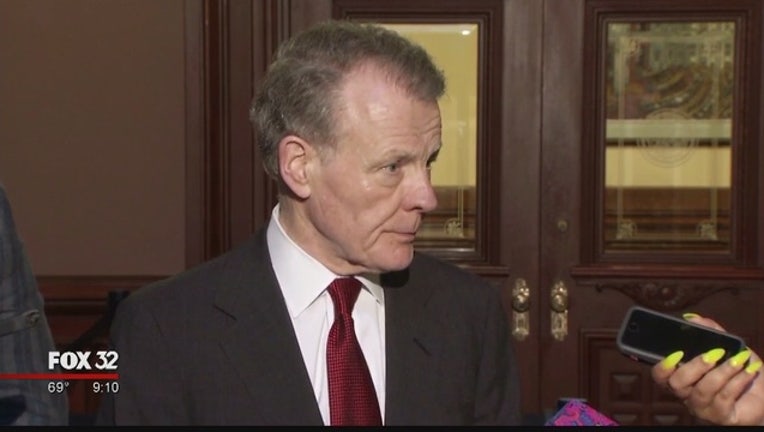Illinois school funding at risk as negotiations break down

This is a photo of House Speaker Mike Madigan
SPRINGFIELD, Ill. (AP) - Illinois' Republican governor and Democrat-controlled Legislature appeared headed for another showdown as negotiations broke down Monday on a school funding overhaul, putting money for districts statewide at risk weeks before classes begin.
Democrats sent Gov. Bruce Rauner a new plan for doling out money to schools that they approved in May but had not yet sent to the governor because of concerns he would veto it.
Rauner, who had set a Monday deadline for Democrats to send him the bill, has said he will use his veto authority to strip additional funding for Chicago Public Schools. His spokeswoman said "swift" action is expected, though he hadn't made any changes as of Monday night.
Senate President John Cullerton, a Chicago Democrat, warned that Rauner's changes would jeopardize money for schools statewide. That's because if legislators can't muster enough votes to either approve or override the governor - scenarios that appear unlikely - the legislation dies, and there's no back-up plan ready to go.
Cullerton urged Rauner to "do the right thing" and sign the legislation, which is aimed at making school funding more equitable and ensuring districts have adequate funds to educate students.
"Students, parents, teachers and taxpayers have waited long enough," he said. "This is a chance to make a huge, meaningful change for Illinois."
Rauner has accused Democrats of sitting on the bill to force a crisis. His spokeswoman, Laurel Patrick, said they were "holding our students hostage and threatening our public schools' ability to open on time."
A new school formula is required as part of a budget deal that legislators approved earlier this month over Rauner's veto. Without new legislation, schools won't get paid. The first payment to schools is due Aug. 10.
While schools are expected to open on time even without state funding, many districts have said they'll have to make cuts or even close their doors if lawmakers can't agree on a plan by fall.
In southern Illinois, Sandoval Superintendent Jennifer Garrison said she's assessing the approximately 500-student district's finances on a week-to-week basis. Without a state infusion, the district might be able to make payroll for as many as two months, considering its cash on hand, reserves and local property tax revenue.
But Garrison said she's frozen spending in the district to essentials only, including power and water.
She said the funding limbo is especially frustrating because the school has recently experienced improvements it hopes to continue, such as its highest graduation rate in years.
"The focus is on politics instead of being on the children where it needs to be," she said. "I hope the leaders can rise above the politics."
A bipartisan group of lawmakers met over the weekend and again on Monday to try to reach a compromise.
Democrats involved in the talks described the closed-door meetings Monday afternoon as "friendly" and positive, and said they asked Republicans to continue to try to reach a compromise.
"We would rather not go to a veto showdown," said Sen. Andy Manar, a Bunker Hill Democrat who sponsored the bill.
But minutes after Manar spoke to reporters, Republican state Sen. Jason Barickman ripped the talks as "a charade" and accused his Democrat counterparts of playing political games.
Democrats then lifted a hold on the legislation they passed in May and sent it to the governor.
Lawmakers from both parties agree the 20-year-old calculation currently used to fund public schools in Illinois is unfair and forces school districts to rely heavily on property taxes, creating huge disparities in per-student funding. But lawmakers have clashed over how to fix it.
The proposed formula channels money to the neediest districts first after ensuring that no district receives less money than last school year. It also includes pension help for Chicago.
Democrats insist the pending proposal is fair since Chicago is the only Illinois district that pays the employer portion of teacher pension costs. Republicans say the new formula means Chicago will continue to get money that it previously received as a block grant. Rauner has called it a "bailout."
___
This story has been corrected to show that Jason Barickman is a state senator, not a representative.
___
Tareen contributed from Chicago.

